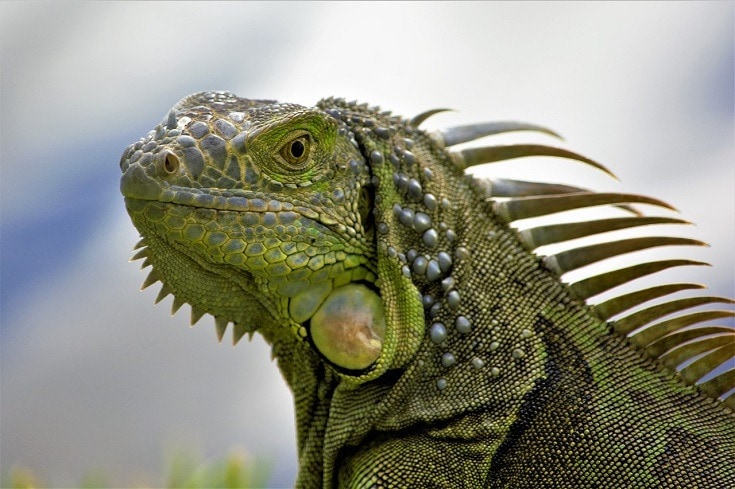Iguanas are reptiles native to Central and South America, their habitat being characterized by warm temperatures and high humidity. Although they are one of the most popular reptiles as pets in our country, there is still some ignorance about the basic care they need to ensure their well-being and best quality of life.
That’s why in today’s article, we want to tell you what basic care an iguana needs to stay healthy and protected.
Tips for Caring for an Iguana
Diet
They are herbivorous animals and their diet should be varied and rich in calcium, with leafy vegetables such as chard, lamb’s lettuce, romaine lettuce, spinach, watercress, endive, parsley, as well as cucumbers, zucchini, melon, or apples forming a fundamental part of their diet. More occasionally (2-3 times per week), iguana-specific foods (no other species’ foods should be given) may be given as a reward.
Prohibited Foods for Iguanas
Because of its herbivorous nature, an iguana’s body is not prepared to digest animal foods, including meat, dairy products, eggs, etc.
– Meat
– Eggs
– Dairy products
– Foods for other species
Other foods not recommended are:
– Citrus fruits such as orange, pineapple or kiwi.
– Broccoli
– Cauliflower
Temperature
Iguanas are cold-blooded animals, so they need a constant supply of heat through the use of a heating system to maintain the temperature such as special iguana lamps. The temperature should be between 24 and 30 degrees (28 degrees is ideal).
Lighting
Our iguana needs ultraviolet radiation (UVA and UVB) which allows it to properly assimilate calcium, so it is necessary that we use a reptile specific fluorescent light to maintain adequate levels of calcium in your body. Excess or lack of this type of light can cause bone problems, so it is important to address this issue, as well as change the bulb once every 6 or 12 months at the most, even if it has not burned out, because the proportion of UV radiation emitted by these bulbs reduces over time.
Terrarium
Your terrarium should be as large as possible and resemble its natural jungle habitat, so that you can enjoy freedom of movement and be comfortable. Therefore, the interior decoration should be made of logs, wood or plants that allow it to climb and hide, while the floor should be made of a substrate based on potting soil, mulch or coconut fiber.
Handling and Care
When handling an iguana, we should try to do so gently and carefully, grasping it by the abdominal area from below and gently. We should avoid punishment, as reptiles are not capable of understanding these behavior modification systems.
Feeding it with our hand will help strengthen the bond between animal and human and consolidate the relationship.
Hygiene
The iguana is a very clean animal, and we must help it stay healthy through good habitat hygiene habits. We should change the substrate in its terrarium regularly to keep it clean and fresh, and perform a deep cleaning of the terrarium every other day.
Periodic Examinations and Veterinary Advice
Periodic examinations and veterinary advice are the best guarantee of well-being for your iguana, as going to the veterinarian will allow us to give him the most appropriate care according to his age, health and specific characteristics to keep him healthy and protected. In addition, it will allow us to prevent diseases and detect others in their early stages, when they are easier to treat.
Here you go! With these tips you can be sure that you will know how to take great care of your iguana. Did we miss any tips? Share them in the comments below.
